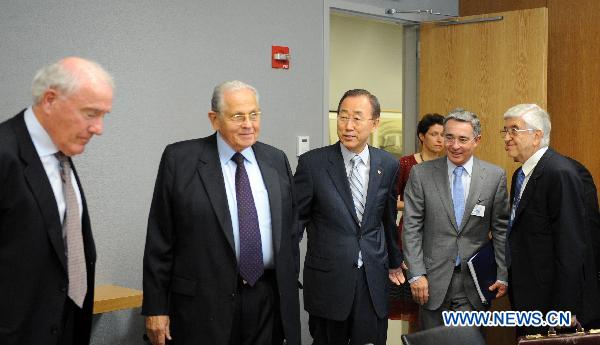Israel's flotilla raid probe aims at restoring image
Leading Israeli academics and pundits, regardless of political affiliation, are consentaneous: the late May flotilla raid has pulled Israel into an international incident that drew attention to its Gaza siege policy, followed by the entanglement of an internal commission of inquiry and then an international one.
 |
|
The Panel of Inquiry on the Flotilla Incident, headed by former prime minister of New Zealand Geoffrey Palmer (1st L), and vice-chaired by outgoing President of Colombia Alvaro Uribe Velez(2nd R), the Israeli member Joseph Ciechanover (2nd L) and Turkish member Ozdem Sanberk (1st R), meet with UN Secretary General Ban Ki-moon (C) at the UN headquarters in New York, the United States, Aug. 10, 2010. UN Secretary-General Ban Ki-moon on Tuesday met with the four members of the panel of inquiry on the Israeli raid on a Turkish aid flotilla bound for Gaza on May 31. [Shen Hong/Xinhua] |
It is still premature to estimate the overall damage to the image of Israel in world opinion. There are no polls and statistics yet available. But it can be ascertained, analysts say, that the hundreds of reports of navy SEALS shooting nine activists to death, which appeared on the front pages of every major world newspaper, did not fare well with the Jewish state.
The Israel Defense Forces (IDF) raid aboard a Turkish ship of the flotilla was the latest in a long list of past military operations that placed Israel in the limelight of international outrage. The handling of the flotilla affair, say analysts, once again conveyed the core, chronic problem of Israel's public relations (PR) skills -- before, during and after a crisis develops.
Pr efforts
The Turkel Commission, whose official proceedings were launched this week in a modest Jerusalem lodge, could have been a golden opportunity to mend, in the eyes of some analysts.
"The commission is more of a public relations attempt," said Prof. Efraim Inbar, director of the Begin-Sadat Center for Strategic Studies at Bar-Ilan University, and "its mandate is limited, but its creation is the result of international pressure."
Israeli Prime Minister Benjamin Netanyahu did not hide the pitch behind the commission, which was regarded as a chance to show the world that Israel is conducting a transparent, objective investigation and convey a message of openness, that the fatal consequences of the May 31 raid on the Turkish ship were inevitable and tragically opposite to the original aim of its planners.
"The appearance of Israel's Prime Minister before this committee today is the best evidence of the high standards by which Israel's democracy functions," Netanyahu said shortly after he strode into the brightly lit hall at the Rabin Guest House.
He said that he was "convinced that at the end of your investigation, it will be clear that the State of Israel and the Israel Defense Forces conducted themselves in accordance with international law."
"The (Turkel) Commission was set up for political reasons, so that Israel could show the world that it is investigating and checking the events that unfolded aboard the Turkish ship and thus shake off the international pressure," Anshel Pfeffer, a senior Israeli military affairs correspondent, told Xinhua.
"The hope is that it will contribute to Israel's image as a law- abiding state which isn't wary of investigating itself," he said.
 0
0 






